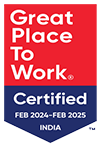
Robotic Process Automation (RPA) is quickly gaining traction across sectors and organizational sizes. With RPA implementation, businesses are seeking operational optimization and enhanced customer experience with simpler administration and control which in return can reduce human errors and save huge costing. According to Forrester, the worldwide RPA market was worth USD 1.89 billion in 2021, and it is expected to increase at a CAGR of 38.2 percent from 2022 to 2030.
While a company can implement RPA without embarking on a full-fledged digital transformation initiative, yet most digital transformation efforts would be incomplete without some intelligent automation capabilities.
The applications of robotic process automation are practically limitless. RPA automates repetitive processes and streamlines workflows across company departments and sectors integrating with AI & ML chatbots.
These digital technology use cases might vary significantly between businesses and are dependent on how software developers execute them. Order processing, data transfer, audits, and invoicing are common RPA silo use cases. Human errors are a distinct possibility in each of these scenarios. Whether it’s an analyst entering an inaccurate email address or a data centre representative accidentally disrupting one of the algorithms, manual errors always over cost an organization time, money, and resources.
Top RPA providers offer simplified solutions designed to allow someone with a few hours of training and limited or no development experience automate basic daily tasks. However, that’s just one aspect of RPA. As with any other aspect of digital transformation, IT leaders need a holistic plan for RPA’s role with strategic outcomes in mind.
A RPA Solution Provider ought to consider few critical factors in detail to implement RPA initiatives intending to ensure maximized productivity & scalability that fuels organizational revenue & growth.
1. Strategic Alignment with Business Objectives
While setting up a RPA program, it is important to align program objectives with the overall DT digital transformation strategy. For example, if improving response time to customer experience is a transformational focus for an enterprise, it is important to prioritize RPA opportunities that impact all the processes involved with customer experience. Hence, keeping the RPA program aligned with digital transformation imperatives is predominant to optimize organisation’s focus & productivity.
2. Establishing an RPA-based Governance Model
With the rise in market interest towards RPA implementation, IT executives need to prepare themselves for these growing automation needs and efforts. Intelligent automation, i.e. RPA in integration with AI & ML, have been marketed as easy to scale which in fact requires very effective governance and a plan for managing huge software bot fleets.
3. Evaluating Business Processes to ensure system stability at scale
RPA performs best in a steady process and system environment. So, any process application updates occasionally might render the RPA deployment obsolete. It’s critical that businesses evaluate RPA’s feasibility in the context of their broader digital transformation roadmap and avoid systems and processes that are undergoing major near-term disruption. It is important to outline repetitive processes & tasks that need no human intervention from the one who does.
4. Managing organization-wide transformation
One of the most prevalent reasons for failure of RPA deployment is lack of appropriate change management planning and implementation.
For individuals who have done their tasks in a specific way for a long time, Enterprise Automated Solutions can enable whole new ways of working styles to which they are not accustomed. This kind of change may cause tremendous worry and uncertainty among individuals, resulting in resistance and diminished momentum over time.
Effective organizational change and cultural transformation management are required for RPA programs to be sustainable and scalable along with clear and open communications that encourage their employees’ knowledge and acceptance.
5. Defining KPIs & success indicators
Defining the quantitative advantages and KPIs for any RPA initiative is as crucial as establishing the success indicators. At times, enterprises risk by setting misleading expectations and disappointing stakeholders without sufficient measurements of performance.
For a RPA programs to succeed, a solid governance model and structure is required along with skilled set of resources to handle well-defined deployment and production management procedures.
Developing these competencies takes time, effort, and concentration which should be carefully pondered upon while planning a digital transformation strategy.
To assure the successful implementation of RPA Solutions across the enterprise with continued support and concentration, Enterprises need to adhere to the fact of establishing a well-defined rigorous RPA governance architecture.
Why you should consider ESSPL?
We at ESSPL strive to develop a new breed of the smarter digital workforce by combining RPA with machine-learning and cognitive technologies like chatbots, predictive analytics, and computer vision to boost process efficiency and aid with labour optimization. Our Knowledge Base is to learn about automated test cases, best practices, and reusable meta bots.
A specialized Centre of Excellence team is established which comprises of trained and experienced Automation Architects, Process Analysts, and Engineers capable of analyzing, identifying, and automating the processes. Our process experts can assist you in identifying and aligning the correct set of processes for automation to achieve the required ROI.
Automation Anywhere, the leading RPA platform vendor, has accepted us as a registered partner. We have a team of AA-certified developers that have worked on live projects. As a partner, we can assist you with the solution ecosystem to which we have access. To learn more about our RPA solutions, visit our website



